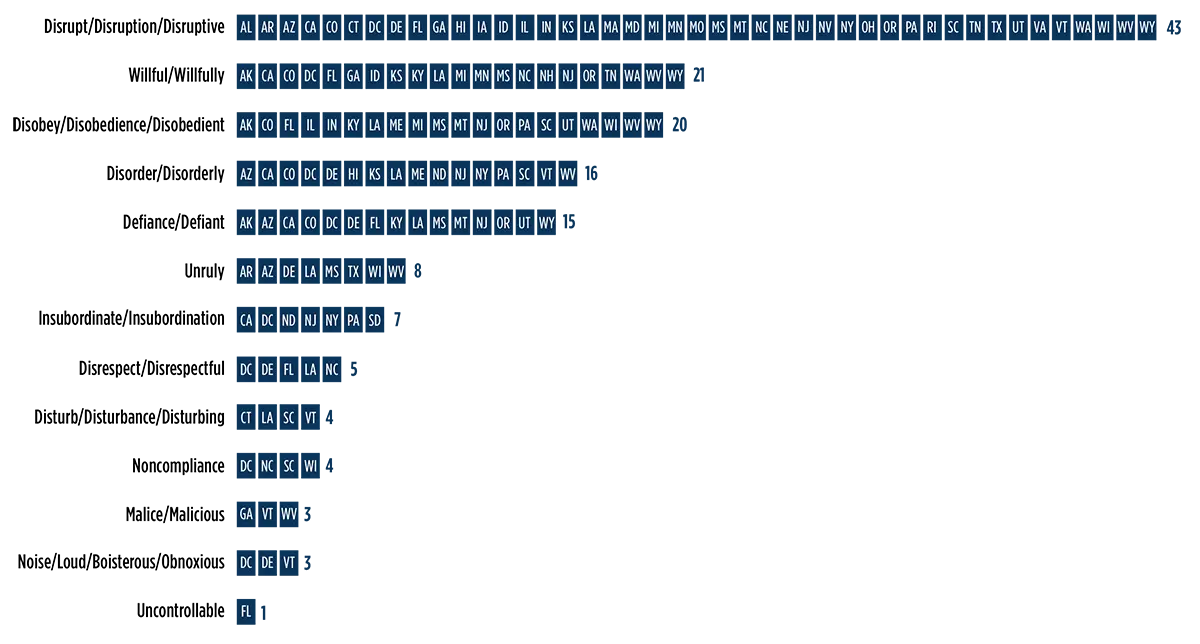In October 2021, a South Carolina judge ruled in favor of students who asserted that criminal statutes using broad and subjective language such as “disorderly conduct” and “disturbing schools” were unconstitutionally vague as applied to elementary and secondary school students, and put students at risk of arrest and criminal misdemeanor charges for minor infractions. The court found that the laws failed to clarify the prohibited student conduct and allowed subjective, arbitrary standards for enforcement. While this ruling dealt with criminal statutes targeting youth for minor offenses, it provides a powerful argument against school discipline policies and codes of student conduct that use similarly vague language.
Child Trends has analyzed each state’s policies around school discipline and found that nearly all states rely on vague or arbitrary language to define student conduct and consequences. This brief summarizes our analytical approach and reviews our three main findings. We conclude with a discussion of how the South Carolina court’s legal analysis—which focuses on the lack of clarity to students, and the lack of an enforcement standard—illustrates steps to improve state school discipline statutes that suffer from similar issues.
Our Approach
Child Trends analyzed state laws and regulations that govern school discipline and student codes of conduct to identify which states use vague terminology in their policy making, whether these states attempted to clarify behavioral expectations, and whether the policies are vulnerable to subjective interpretation. For our analysis, we first collected codified policies using a series of keyword searches in both the NASBE School Health Policy Database (which includes policies enacted as of 2019) and the NCSSLE Compendium of School Discipline Laws and Regulations (which includes policies enacted as of 2020) for variations of commonly used vague or subjective terminology. The research team identified an initial list of vague terms from the South Carolina ruling, then coded an initial subset of five states to identify additional vague language used in discipline policy before coding the full collection of policies we identified. In instances where policies referenced another relevant policy, those referenced policies were incorporated into the analysis.
Findings
We discovered that most states currently over-rely on provisions with vague language that can result in unfair disciplinary action. We found widespread and varied use of vague language in these laws, which often fail to define the prohibited conduct and allow a significant degree of arbitrary interpretation. This uncertainty puts youth at risk of disparate discipline enforcement that has been shown to negatively impact youth of color.
Nearly all states use vague language in their discipline policies. We identified 156 policies across 48 states and the District of Columbia (DC) that rely on vague language to enforce disciplinary consequences (we found no results for New Mexico or Oklahoma). The most frequently used terms were “disrupt/disruption/disruptive” (43 states), “willful/willfully” (21 states), and “disobey/disobedience/disobedient” (20 states). These policies broadly label student misbehavior as “disrupting” classrooms or learning environments in a “willful,” “disorderly,” or “unruly” fashion.
Prevalence of vague language in school disciplinary policies, by state where employed

Many states attempt to clarify behavioral expectations by either defining vague terms in their statutory language or mandating that school districts provide further clarification. Although nearly every state in our analysis uses vague language in their discipline policies, many of those policies attempt to clarify the behavioral expectations by listing specific misbehaviors that are subject to discipline, defining vague terms, or identifying when and where the policy applies to reduce subjectivity and increase objectivity.
- Thirty-two states and DC (Appendix A) identify or require districts to identify the specific behavioral misconduct being prohibited. For example, Oregon requires districts to “develop a student handbook, code of conduct or other document that … defines acceptable norms of behavior for students and the types of behavior that are subject to discipline.”
- In 16 of those 32 states (Appendix B), policies include definitions of vague terminology such as “substantial disruption” or “serious misbehavior.” In Rhode Island, for example, a disruptive student is defined as “a person who is subject to compulsory school attendance, who exhibits persistent conduct which substantially impedes the ability of other students to learn, or otherwise substantially interferes with the rights stated above, and who has failed to respond to corrective and rehabilitative measures presented by staff, teachers, or administrators.”
- Finally, 33 states and DC (Appendix C) define the scope of their disciplinary policies by establishing where and when they apply. For example, Florida statute describes the times and locations under which students must abide by the rules of the school board.
Despite statutory attempts to define behavioral expectations, state discipline policies still leave room for arbitrary enforcement. Although many state discipline policies include one or more definitional elements—identification of prohibited behavior, definition of vague terms, and description of when and where the rules apply—they still fall short of achieving the clarity that school systems need. When statutory language addresses one definitional element but not another, such gaps mean that students may not fully understand the context in which their behavior is subject to disciplinary consequences and that teachers, administrators, and school boards have a standard for enforcement that is open to interpretation. For example, Massachusetts defines a disciplinary offense as “any alleged or determined disciplinary infraction by a student, except for” a handful of specified criminal acts. So, while the Massachusetts policy includes a definition, it does not enumerate the specific noncriminal conduct subject to discipline. Only 14 states (Appendix D) include all three definitional elements within the policies under review.
Court Ruling Indicates a Path for Improvement
The South Carolina court addressed criminal statutes—not state school discipline statutes—in presenting its analysis of clarity and enforcement issues in statutory language. Nevertheless, the court’s ruling offers states a useful guide to audit current school discipline statutes for opportunities to reduce the risk of arbitrary enforcement and promote greater consistency and fairness. We suggest that states can take the following steps, beyond simply replacing and defining vague terminology, to improve state school discipline statutes:
- Enumerate specific prohibited behaviors for students.
- Ensure that specific prohibited behaviors are distinguishable from developmentally appropriate child and adolescent behavior.
- Establish where and when the policy applies (e.g., during school hours, during school activities, etc.).
- Account for students’ knowledge or intent of wrongdoing.
- Account for the outcome of students’ behavior.
By following this guidance, states can reduce disparate impacts on children and youth of color, and benefit all students, by giving students better notice of behavioral expectations and guiding administrators and educators in their management of student behavior.
Click below to view the list of states and relevant policies.
Appendix A - Prohibited Behaviors
Appendix B - Defined Terms
Appendix C - Scope
Appendix D - Comprehensive Definition
© Copyright 2025 ChildTrendsPrivacy Statement
Newsletter SignupLinkedInYouTubeBlueskyInstagram



